With how many articles I end up writing about Rei Hino, you’d think I should have named this blog Sailor Un-Mars’ed. But to be fair, it’s not entirely my fault that between the anime and manga, there are so many riddles about this Christian school-attending Shinto priestess who suffers from split personalities.
Today I’d like to take a look at trying to unravel the mysteries of Rei’s family tree and, specifically, which side Rei’s grandfather lands on.
I hope you join along, it’s going to be an interesting ride!
It probably goes without saying, but Rei’s grandfather acts totally differently in the anime and manga, to the extent that I would simply consider them different characters and chalk this one up to another example of how the anime and manga are not always complementary universes.
The anime also doesn’t really bother to address Rei’s parents pretty much at all, as far as I recall, so we won’t be able to look to the anime for any help on this one. Nope, today we’ll be breaking out our copies of the manga and doing a thorough reading to try to suss out the details.
First off, the obvious information!
We know that Rei and her grandfather are related. You know, because he’s her grandfather. We know that her last name is Hino, and we know that his last name is also Hino.1 That’s all pretty simple, and I’d say we’re off to a good start.
Further, we know that Rei’s grandfather is from her mother’s side,2 so…
…wait, what? We already know that he’s Rei’s maternal grandfather, and yet I’m still writing this article asking that question??
Yes, that’s correct, and before you take to social media and start screaming “click-bait,” please hear me out. As you may recall, though, they both have the same last name. Typically, you don’t have the same last name as your maternal grandparent.
We’re explicitly told in the Black Moon arc that Rei is living with the grandfather on her mother’s side. But the information that we’re given later in the series, specifically in the Casablanca Memory side-story, makes the story far more convoluted.
Casablanca Memory doesn’t directly touch on which side Rei’s grandfather is on — in fact, the language he uses to refer to both of her parents is neutral and non-familiar, referring to her father and mother as 父親 (chichioya; father) and 母親 (hahaoya; mother) respectively — it does give us more information about Rei’s father.
Specifically, the story tells us that her father is also named Hino.3
「民主自由党の火野戦士の娘さんだそうですよ」
“I think that’s the daughter of Statesman Hino, from the Democratic Liberal Party.”
As an interesting aside, the party that Mr. Hino apparently belongs to, the Democratic Liberal Party, was a short-lived political party in Japan that existed from 1948 to 1950.4 The party survived on through a merger as the Liberal Party,5 before dissolving again in 1955 in another merger to become the Liberal Democratic Party,6 which has been the ruling party of Japan nearly non-stop ever since.
So basically, Ms. Takeuchi probably just chose a now-defunct name of the ruling political party in Japan in order to avoid any direct political connections. Adding a party name at all was entirely unnecessary to the sentence in Japanese, but that’s neither here nor there.
Back to the subject at hand, the remark made in the Rain Tree restaurant explicitly states that her father is also named Hino. That, unfortunately, makes everything complicated. A maternal grandfather and father should generally not have the same last name, unless by some odd twist of fate her mother and father were both unrelated and had the same last name.
Another possibility is that we have to assume that one of these three conflicting facts — i.e., that (1) it’s her maternal grandfather, (2) that he’s named Hino, and (3) that her father is named Hino — is incorrect. While this is very likely the case and it’s simply an oversight, much like the strange issue with Ami and her mother keeping the Mizuno name after divorce, I like to avoid that explanation to the extent possible, since then you start cherry-picking which information in the series best supports your theories.
And fortunately for us, we actually do have another theory that could neatly explain everything away.
While Japanese law requires newlyweds to take on one of their respective family names upon getting married,7 there’s no rule over which name they take. Though still very uncommon even nowadays, with only a paltry 4% of couples choosing to take the wife’s family name after marriage,8 it’s entirely possible for the husband to essentially become a member of his wife’s family.
There are a myriad of reasons why this would be the case, though we have no information here so I can’t even begin to speculate.
Since Rei never mentions any aunts or uncles, it’s entirely possible that the family line would have ended with her grandfather and there would be no one to pass the priestly duties down to, so Rei’s father agreed to join their family.
And that about sums it up! Considering all the negativity Rei seems to express toward men, and the fact that it’s directly stated in the Black Moon arc, I think it’s safe to say that Rei’s grandfather is definitely on her mother’s side. The issues with the names could be easily resolved by either assuming that Act 3 was incorrect and that Rei’s grandfather is not named Hino, or that Casablanca Memory is wrong and Rei’s father has a different last name.
The latter option is incredibly unlikely, because her parents would have had to divorce prior to her mother’s death in order for her maternal grandfather to have custody of her, and that seems like it would have been an important part of the story.
So what do you think happened, was this just an oversight by Ms. Takeuchi, or maybe there’s some other way this could have all come to happen? I’d be interested in hearing about it, especially if the live-action PGSM could shed any extra light on the story!
References:
- See Act 3 of the manga. 「火野さんのおじいちゃんとこのレイちゃんは変わりものなの」 = “That Rei girl, from old-man Hino’s place, is pretty strange.” ↩
- See Act 14 of the original manga, Act 15 of the Shinsouban and Kanzen releases. 「彼女のお母さまって体が弱くて死別なさったんですってね。ずっと母方のおじいさまと火野神社に」 = “Her mother fell ill and died. She’s lived with her maternal grandfather at the Hino shrine ever since.” ↩
- See Casablanca Memory. ↩
- See Democratic Liberal Party (Japan) (Wikipedia) ↩
- See Liberal Party (Japan) (Wikipedia) ↩
- See Liberal Democratic Party (Japan) (Wikipedia) ↩
- See Japan upholds rule that married couples must have same surname ↩
- See Rate of Family Name Changes (data from 2016) ↩
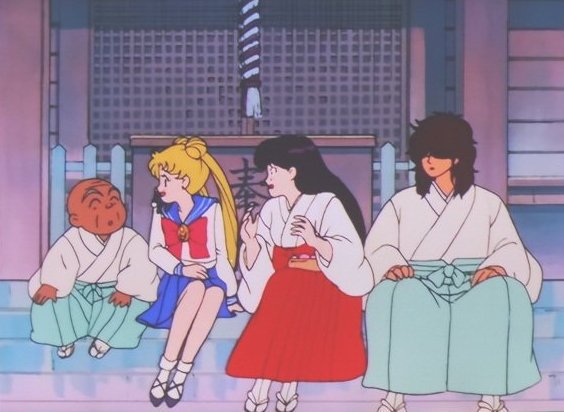
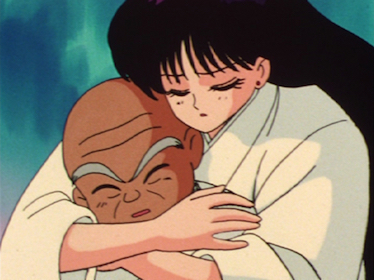
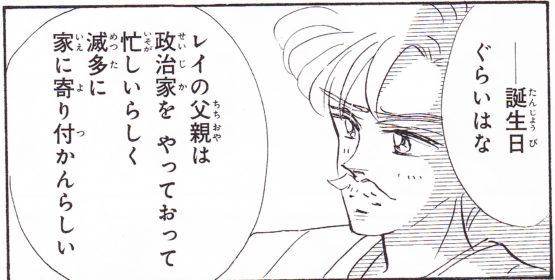
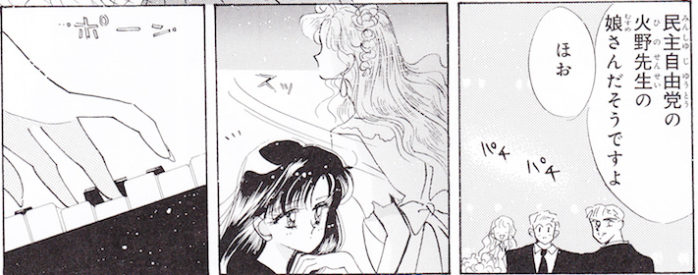
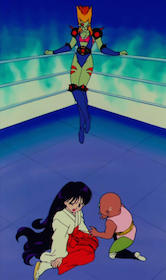
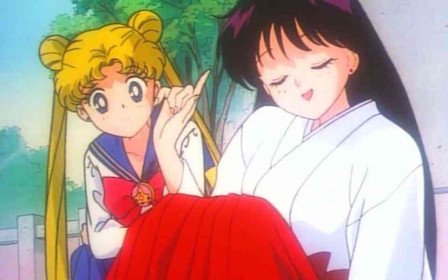

I really like your possible explanation:
“Since Rei never mentions any aunts or uncles, it’s entirely possible that the family line would have ended with her grandfather and there would be no one to pass the priestly duties down to, so Rei’s father agreed to join their family.”
I hate assuming oversight, myself. So this works for me lol.
Assuming a mistake in the story or that “a character is lying” is obviously the fastest way out in 99% of the cases, but honestly that kind of ruins the whole point in researching and discussing this stuff in the first place. =p Otherwise, we might as well just say “oh, the whole story was a dream!” and be done with it.
It’s a lot more fun to try to make even the inconsistencies work!
“…it’s entirely possible for the husband to essentially become a member of his wife’s family.” Yes, this is Japanese practise that is quite common – look up “Mukoyōshi” on Wikipedia for a short introduction on the topic. You also mentioned live action PGSM; Rei’s grandfather does not appear there, but it is possible that PGSM Mamoru was supposed to be Mukoyōshi to Hina (his live action girlfriend before meeting Usagi).
I think it’s important to point out that there is a distinction between the mukoyoushi concept and just changing your name to your wife’s surname. While these two generally go hand-in-hand, not every case of assuming the wife’s family name accompanies the husband being adopted by the wife’s family.
Personally, I don’t believe the case with Rei’s father is a case of mukoyoushi, because that would involve him being adopted by his wife’s family and generally be accompanied by him taking over the family business.
Not only does he have zero involvement with the shrine, but he seems disinterested in Rei and her life there.
I’d be more inclined to believe that he just agreed to change his family name to his wife’s.
Can you do some articles on the musicals and the live action series?
I’ve briefly touched on the live-action series… twice? But I agree, I’d love to do more articles about it.
How Did the Moon Frisbee Become the Moon Boomerang?
Where is the Cast of the Live Action Sailor Moon Today?
As for the musicals, I have been planning on doing a “where are they now?” post for that soon too, but they definitely also deserve a deep dive into the story and lore.
Any chance you could listen to and summarize the Sound Drama Collections “Prelude of Romance,”
“Kaette Kita Ail to An! Bishoujo Senshi-tachi no Yume o Genjitsu ni Sakusen Hatsudo!,” and “Toki o Kakeru Bishoujo Senshi?” The other three audio dramas have been translated by MissDream but those three have not and I’d love to know what they’re about. (You can find them on YouTube.) The audio dramas are so random and weird and fascinating and there isn’t really a lot of information about them, so it might make for some interesting articles. Just something to think about! Love this blog!
I’ve only really looked into the Sound Drama Collections in passing, but I’ve read summaries of some of the stories before. I love that they tell both a separate, yet complementary, story to the anime.
Since they use the same voice cast, it’s really hard to tell how they should be treated with respect to canon, too. Should we consider them a part of the same universe as the anime? A completely different universe? Or maybe even case-by-case?
Here’s an idea. Both families just happened to be both called ‘Hino’ beforehand. Well it’s not to implausible. I do have a friend who’s parent’s shared surnames before marriage.
It was ‘Smith’ but anyway. 😛
I always assumed that Rei’s Grandfather was maternal, since she does seem fine with him despite the formers perverted tendencies.
Given that her father is a politician, he probably came from a wealthy or industrious family. And likewise received a high education, which may have influenced Rei being sent to a place like T.A.
While her mother possibly came from a more humble origin. Maybe she too worked as a shrine maiden at Hikawa, and that’s how they first met. And why Rei prefers to live there, instead of say somewhere more luxurious. As that allows her to be more closer in a way. As we’re shown, her father spends little time at home due to work, resulting in Rei naturally growing more emotionally attached to her mother as a result.
Granted this is all just an assumption, but we’re not exactly given much to go with. And Naoko isn’t exactly consistent when it comes to plots and characterisation.
Of course families don’t really play much of a large role in the series, so we don’t know entirely what their marriage or Rei’s childhood was like. Even in the live action series, her mother’s death serves little beyond a plot device to trigger for their friction. And that’s about the extent of it sadly.
Indeed, it puzzles me why PGSM cut Rei’s Grandfather out, since he might have served as a kind of mediator, and provided some more insight into the Hino’s dysfunctionality.
He was also noticeably cut from the first season of Crystal, though does get a mention on the third arc.
I also find it odd how the designs between the Anime and Manga differ so drastically. Did Naoko originally have another look in mind, and then changed it at the last minute, while his introduction episode was in production?
Them both being named “Hino” is also entirely possible, and I guess you could also make that argument for the Mizuno issue concerning the divorce of Ami’s parents. Pretty unlikely, but entirely possible!
As for the designs, the anime was definitely going for a more comedic take on the series, so I’m pretty sure they went with that design. Considering Rei’s grandfather didn’t show up until much lately, Naoko probably didn’t make a design for him until much later, and just didn’t want to go with the silly, tiny-old-man image that the anime made up independently.
Maybe the idea is that for all the senshi their parents already had the same last names before marriage.
This may be because they did’nt want to invent surnames for both the sides of each senshi’s family as it would require too much thought.
Actually most anime\cartoons\videogames don’t really have maiden names for the main characters’ moms.
Or maybe the bishie grandpa is from one side and the wrinkly bald small grandpa is from the other side
Well, at least this Rei has family…
Hey, there is a mistake in references. The quote about Rei’s grandfather being her maternal grandfather appeared in act 15 of the shinsouban and kanzenban releases (Act 15 Infiltration – Sailor Mars) 🙂
You’re absolutely right! The article has been fixed now, thanks!
Is it possible Rei’s mother family had a political tradition, and thus he adopted their name to improve his chances at politics? A bit like the Gandhi name in India?
Hmm… seems unlikely since it’s not like her father was an incredibly high-ranking government official, but considering how little we know about the whole family situation, I guess it’s hard to rule anything out!
Inasmuch as a filler anime episode probably counts…
I don’t think aunts or uncles are mentioned, but — and I’d have to check the subs — isn’t the artist Rei visits during Stars (carved her a phoenix necklace as a little kid, has bad habit of breaking failed creators in a rage, etc) her cousin?
(Then again he’s not her age either, so perhaps the original draft was a generic ‘uncle’ before the scripter had to correct it…)
My head-canon is, that Rei’s father is an opportunistic, chauvinistic a*****e.
Traditionally, a shrine and its high priest are somewhat reknown, honorable – so their name would have some weight and associated history or implied traditional value.
Maybe his name was Tanaka or something, he wanted to become a famous powerful polititian. When he married Hino Risa, he took her name, because it was a ‘good’ name, that may have helped him move upward in his political career. He may have even promised his piece to take over the shrine and responsibilities. But we all know how the story ends, especially in regards to his responsibilities to his daughter. (Btw, I had somewhere in my head, that it used to not be entirely uncommon in Japan for men to take the bride’s name, esp., as in this case, when the woman was from a respected / wealthy family – this may or may not be derived information refering to mukoyoushi.)
When her mother died, her father basically abandoned Rei, left her with her maternal grandfather, not even bothering to show up at her birthdays (having an assistant who remembers his daughter for him). As the legal parent he may very well decide to have someone else look after his child, at least he chose this someone to be a next of kin (although, that may have been to save face to some degree, if anyone ever bothered to look into his family relations; ‘Hey, I left her at my family’s shrine, to become a noble miko – that’s good education for a girl!’). He’s got what he wanted, and Rei not being a boy (so, not the male junior heir to his legacy) is of no further interest to him.
Leaving Rei scarred by the first male model in her life, who not only was to protect and care for her after the tragic loss of her mother, but also was the one her mother had loved and trusted (and who wouldn’t live up to any of his sacred wedding vows). (PGSM additionally has him portrait as only ‘meeting’ with Rei when he needs her as his poster child / present himself as a family politician.)
I’ve fallen into your blog and I love it.
I think that Rei’s father taking on his wife’s name is the most likely answer, but there is a possibility that her parents shared the last name because they were related. Cousin marriage isn’t necessarily common in Japan, but it happens. It also wouldn’t be an impediment to a political career, since Naoto Kan, a former PM, was married to his first cousin. They could also be less closely related. In the absence of a male heir (assume that her grandfather was the elder brother and had a younger brother who had one son —Rei’s father— and died early, leaving only one male heir in that generation), their marriage could have been encouraged so that Rei’s father could take over as priest upon Rei’s grandfather’s death. That could also be another reason for the distance in the family, especially if her father felt that Rei was embracing a role he hated.
Just a (very late) thought.
I am way too late for this, but has he ever been called grandpa Hino officially. I think he is never reffered as that in the manga and in the old show credits he is simply Rei’s grandfather. So it might not even be an issue in the first place.
He was called Grandpa Hino in a few places in the manga. They’re referenced in footnotes 1 and 2 of this article.
the theory of rei’s father taking the name of her mother matches the events in ‘kimi no na wa’ where the father married the mother and was adopted into her family. he took his wife’s family name and was supposed to work for the shrine the family takes care of, but then his wife died and he left the shrine and decided to go into politics, separating from his daughters.